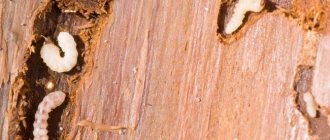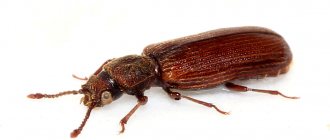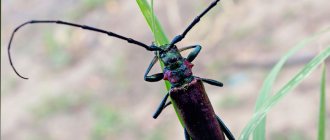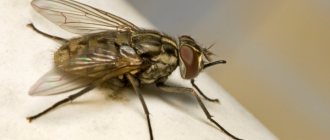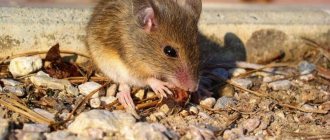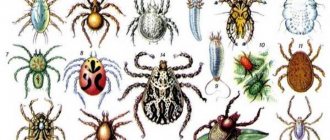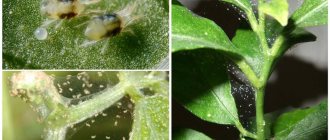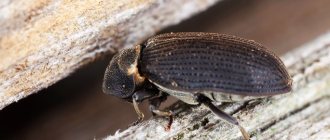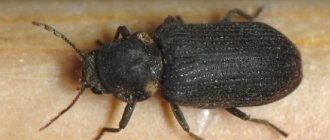Bark beetles are not as harmful to humans as lice or bedbugs. And yet their presence in the house is extremely undesirable. Firstly, they destroy supporting structures - and there is always a risk of the building collapsing. Secondly, they are carriers of fungal growth, which over time forms mold, which is potentially hazardous to health. Therefore, at the first suspicion of their presence, it is necessary to urgently take measures to destroy them.
There are plenty of ways to get rid of bark beetles in a wooden house, but, as practice shows, not all of them are effective.
How to find out about danger
In a wooden house, the fight against the bark beetle begins with its detection. There are several alarm bells that will indicate its presence on the premises. What you need to do to avoid missing them:
- Carefully inspect the walls, ceilings, floors, baseboards, ceilings, and wooden furniture.
- Find small holes in them.
- Notice fine sawdust dust, white or brownish, on the floor, near the baseboards.
- Hear a strange crunching noise coming from the walls at night, reminiscent of a clock ticking. This bark beetle sharpens wood, as it wakes up only with the onset of darkness.
- The easiest way to detect a bark beetle is on the ceiling, because dust will fall from it and whole pieces of wood will begin to fall off if there are a large number of passages.
When purchasing a wooden house, carefully inspect it for the presence of insect pests. Often owners, unable to get rid of them, sell their mansions literally for next to nothing.
This is interesting. In ancient times, the crunching sound coming from wooden walls at night instilled superstitious fear in people. They had no idea that it was coming from a bark beetle and called it a “death clock” because it resembled a ticking sound.
Prevention measures
By following preventive measures, you can protect trees and wooden products from bark beetle infestation.
In the garden
- To prevent the appearance of bark beetles in the garden, you need to regularly inspect trunks and branches for holes.
- Preventative spring garden treatments, pruning, whitewashing of trunks.
- Good care: fertilizing, watering, protecting trees from harmful insects will help the tree resist pest attack. The bark beetle settles on weakened trees .
When purchasing and storing wood
Bark beetle larvae cope with boards very quickly, so when purchasing and storing you need to follow a number of rules:
- store boards and logs without bark, since most often bark beetles infest under it;
Bark beetle.
- when purchasing materials, check for the presence of bark beetles;
- store in a dry and clean place;
- carry out preventive treatment before storage;
- If damage is detected, treat the wood, or, in extreme cases, in case of severe damage, burn it.
If you are not sure that the bark beetle population has been completely destroyed, it is better to call specialists who are guaranteed to deal with all individuals.
Chemicals
If a bark beetle is found, measures should be taken immediately to get rid of it. First of all, you need to know how to treat wood in your house in order to stop the process of its destruction. The modern chemical industry suggests using the following drugs:
- NEOMID StopBug (antiseptic composition);
- Antibug (systemic insecticide);
- Tree healer (new generation antiseptic);
- Clipper (a new generation bifenthrin insecticide, a powerful poison for the bark beetle);
- Confidor Extra (chloronicotinyl systemic insecticide);
- Senezh-Insa (deep-penetrating antiseptic that rids the house not only of grinding beetles, but also of fungi and mold).
Photo:
These drugs help to effectively combat bark beetles that have settled in the home. However, it is not enough to know how to treat wood; you need to learn how to do it correctly:
- Select the wire according to the diameter of the holes. Stick it into the hole until it stops and turn it several times.
- Carefully read the instructions for the purchased drug. Act in strict accordance with it.
- Wear protective clothing, gloves, a mask, a respirator, and safety glasses.
- Take the insecticidal preparation into a syringe and inject it into each stroke.
- Treat the affected areas from above with the same product, spraying it with a spray bottle or wiping it generously with a sponge.
- Take a shower.
- Repeat all the same steps after a week, and then again after 2 weeks.
- Seal all holes with acrylic or silicone sealant.
Throughout the entire period of fighting the bark beetle and for several months after that, it is necessary to carefully monitor whether all pests have been eliminated. As soon as any suspicions arise, immediately take appropriate measures and repeat the processing again.
Are there bugs in the house: what to look for
Although the appearance of pests that feed on wood is usually accompanied by characteristic sounds - ticking, clicking, rustling and other unpleasant noises, no one usually pays attention to these first “symptoms”. And in vain.
Such insidious insects as bark beetles, longhorned beetles, grinders and wood borers are capable of invading a building and “undermining” it to its very foundation. Of course, one, ten or even a hundred beetles are unlikely to somehow affect the stability of the structure. But in cases where the number of pests increases to many thousands (and sometimes tens of thousands), it becomes simply impossible to ignore the problem.
Among the signs of the appearance of your future “opponents”, in addition to the noises already noted above, the following can be highlighted: drill flour (shavings, wood dust) appears, which can usually be seen on various surfaces - walls, floors, and sometimes even on the ceiling.
Wood-boring beetles can target all wooden objects in the house, including furniture, walls, and supporting structures. If chair legs or closet shelves break over time, it's not so bad. But if the beetles get to the ceiling beams and ceilings, the entire house comes under attack, which imperceptibly loses stability and can collapse at any moment. That’s why it’s so important to detect traces of the beetles’ “work” in time.
Grinder beetles can damage not only wood products, but also food, spices, herbariums, books, icons and painting collections!
Smoke bomb
Increasingly, a smoke bomb is used to destroy bark beetles. For example, "Pawn B". It is inexpensive, easy to use, effective (gas penetrates into all passages), has a fast action and does not leave traces of corrosion on metal structures. The insectoacaricidal agent is a pyrotechnic mixture in cans. The active substance is cypermethrin (pyrethroid).
Experts do not recommend using it yourself. The product belongs to hazard class III. That is, the slightest violation of the dosage or some more serious error can have a harmful effect on the human body.
Recommendations for use:
- A piece weighing 50 g is used to process an area of 250 m3.
- The indoor temperature should not be lower than 10°C or higher than 25°C.
- Before using it, close all windows and ventilation hatches. If complete sealing is not ensured, the smoke bomb will be useless, since the gas will immediately find its way out into the street.
- At the time of treatment, there should be no one in the house: neither people nor pets.
- After lighting the wick, you must wait until the smoke begins to emit intensely (this happens within 20 seconds).
- Leave the premises for 8 hours.
- Put on a gas mask and protective clothing, open all windows and doors, turn on the ventilation for 2 hours.
- Only after this can you go in and remove the destroyed insects.
At the same time, the instructions for the “Pawn B” smoke bomb clearly state that only specially trained teams have the right to use it in residential premises. Therefore, it is not recommended to get rid of bark beetles in a private wooden house with its help. All responsibility for carrying out this procedure will fall on you.
Attention! Smoke bombs are strictly prohibited from being used after the expiration date, and an empty can after use requires proper disposal as specified in the instructions.
Why is fumigation the most effective control method?
The gas treatment procedure takes about a week, and can only be carried out at positive ambient temperatures (which is why this is impossible in winter). At negative temperatures, gas will not be released, and after that a complete degassing cycle will not occur.
The effectiveness of the product is due to the fact that the toxic compound, even at low concentrations, can destroy all living things in the area of effect. Being quite heavy (phosphine is 1.5 times heavier than air), the substance fills all the cracks and passages, thus “reaching” both the larvae and the beetles. The latter have no chance of survival: from acute poisoning with toxins they die instantly.
Folk remedies
If you don’t want to be poisoned by chemicals and smoke bombs, folk remedies that you can prepare yourself will help you get rid of the bark beetle. However, it should be borne in mind that they are significantly inferior in effectiveness to store-bought drugs. Therefore, they are recommended to be used when the extent of damage to wooden structures and furniture is minimal. Treatment follows the same scheme as presented above for the use of insecticides and antiseptics. Firstly, you can use some substances in their pure form, without mixing them with anything:
- used machine oil;
- Vaseline oil;
- dichlorvos.
Secondly, you can prepare folk remedies according to special recipes:
- Mix 300 ml of turpentine and 100 ml of kerosene.
- Mix 400 g of crushed rosin and 500 g of liquid paraffin. After boiling, add 100 ml of sunflower oil. Turn off the heat after a couple of minutes.
- Mix 300 ml of turpentine, 100 g of tar and naphthalene.
The prepared liquids are injected into the passages using a syringe, then applied to the surface of wooden walls (ceilings, floors). After repeated treatments, the holes are sealed. There is no need to think that folk remedies are safer than store-bought chemicals. Many substances in their composition emit unpleasant odors that irritate the mucous membranes of the nose and throat, as well as disrupt the functioning of the lungs. Therefore, protective measures must be present.
Signs of infection
This type of insect is small in size and inconspicuous in color; in order to notice them, you should carefully examine everything.
- A brown coating appears on the floor. It is left behind by insects as a result of their vital activity.
- Inspect the plantings on the site. Insects hide under the bark, leaving voids and passages. There may be dust around.
- You can also determine the pest’s habitat by ear - a quiet rustling sound will be heard.
Recommendations
Pest experts give useful tips on how to destroy bark beetles in a wooden house with minimal losses to your own health and the interior of the premises.
If the affected area is small, you should start the fight with folk remedies. And with the most gentle ones - Vaseline oil. If you cannot get rid of the beetles, use mixtures with turpentine and kerosene. The next stage is the purchase of chemicals. The last stage is professional pest control.
To get rid of bark beetle in the kitchen, you must first remove all food from it. It is advisable to treat this room with petroleum jelly rather than with powerful chemicals.
You need to be prepared for the fact that most beetle killing products spoil the appearance of wooden coverings.
If the surface is damaged too much, the top layer must be cut off and burned. Do not use power tools, as they will spread sawdust with larvae and adults throughout the house. Treat the remaining part with an insecticide. Glue an uninfected piece of wood on top to mask the traces of pest control.
If you manage to remove the bark beetle from a wooden house, make sure that the insects never return. To do this you need:
- Make sure that the humidity in the rooms does not increase. To monitor this indicator, buy a hygrometer.
- Dry damp wooden walls with a heat gun.
- All rooms must be thoroughly ventilated.
- Treat all wooden surfaces with Gloss or Polish. They contain substances that repel bark beetles.
- If the wooden walls in the house are not treated with anything, protect them with sodium fluoride. Dissolve 250 g in a bucket of hot water, cool, rub the surfaces.
If possible, you should try to find out how the bark beetles ended up in your home. If you can eliminate the cause, you no longer need to be afraid of re-infection. The breeding ground can be any wooden buildings in the yard - dilapidated and half-rotten, as well as a beetle-infested garden. Talk to your neighbors. If such a scourge is observed throughout the entire district, it needs to be gotten rid of in a comprehensive manner, “with the whole world,” as they say. If you act alone, you will not be able to stop the invasion.
How dangerous is the bark beetle?
Up to 700 thousand bark beetles are found in nature. One of the most dangerous representatives of this family is the typograph bark beetle. He leaves a system of passages in the wood, similar to a typographic plateau. The beetle is black-brown in color, measuring from 3.5 to 5.5 mm with transverse stripes on the back. At the end of the back there is a wheelbarrow - a recess into which he puts wood dust and throws it out of the move. The pointed cephalothorax improves its movement along the canal. The hairs covering the body and paws help clear passages.
Bark beetle typographer
As soon as spring comes, the male looks for a place to attract females. It gnaws a hole in the tree and prepares a mating chamber. The pheromones it secretes attract 2 females. Females begin to make vertical passages in which they lay eggs. One female can lay up to 80 eggs. The eggs hatch into yellow or colorless larvae that feed on the fibrous part of the bark. One larva can eat up to 10g of wood per day.
The larvae move along the canal with the help of calluses located on the stomach, gnawing out more and more new passages. Moving along them, the larva grows and at the edge of the passage turns into a pupa. An adult insect emerges from the pupa. The life cycle of bark beetles is 2 months. They overwinter under the leaves, and next spring everything starts all over again.
Printer's larva
The second most dangerous beetle is the shashel (furniture grinder). They are similar in terms of damage.
Shashel
Bark beetles cause great damage to coniferous trees. They settle not only in pine, but also in fir and spruce, feeding on bark and bast. Pests choose those trees that have thick bast. This is the fibrous tissue of a tree, located on the back of the bark. It has a lot of nutrients.
Bark beetles do not settle in young spruce trees because they protect themselves by secreting resin. The resin closes the entrance hole, and the bark beetles die inside the tree. Therefore, beetles choose coniferous trees over 60 years old, which produce small amounts of resin.
Bark beetles also occupy diseased and weakened trees and freshly cut logs. Wooden buildings are often attacked by insects: houses, bathhouses, sheds, outbuildings. Bark beetles turn wood into dust. They often damage beams and load-bearing floors, which can collapse and cause injury to a person.
Bark beetles damage trees in a summer cottage. Having spoiled one tree, they fly to another. There is a danger of destroying the entire garden. They also gnaw passages in furniture, spoiling its appearance. Typograph bark beetles carry fungal spores that contribute to the growth of mold.
Traces of presence on the apple tree
Pest control
If a wooden house is infested with bark beetles, even the most powerful chemicals are unlikely to help. The only way out is to order disinfestation of the premises.
Fumigation with phosphine
Most often, professionals use phosphine for this purpose. The gas acts like a smoke bomb: it penetrates deep into all passages and affects the insects hiding there.
This is a poisonous substance. Therefore, specialists work in gas masks and protective suits. They carefully calculate the concentration of the product used and then destroy its remains. After the procedure, the building is ventilated for 4-5 days and during this period of time is not suitable for habitation.
Microwave method
Recently, exterminators are increasingly using microwave installations that generate high-frequency electromagnetic radiation.
The walls warm up to 60°, and the bark beetles inside them die. This is one of the newest and at the same time expensive methods to get rid of beetles. Popularity and cost are due to two factors that are absent when exterminating pests by other methods. Firstly, there is no danger to human health. Secondly, the surface of the wood does not suffer from such treatment, so the interior of the house will remain untouched.
Exterminators have many different ways to combat bark beetles that have invaded wooden buildings. They are always previously agreed upon with the owners and selected based on the scale of the problem.
If you want to get rid of tree beetles in your home, act immediately. The longer the process of their destruction is delayed, the less chance there is of saving the home.
What damage does the bark beetle cause to trees and wooden buildings?
The greatest damage to wood is caused by larvae. Before pupation, within a month of development, only a few larvae are capable of destroying an adult plant.
Wooden buildings on the site - a house, a barn, a bathhouse - are also afraid of the beetle. If an insect appears in load-bearing structures, the building may settle, tilt, or simply collapse.
In addition to making passages, insects carry fungal spores, which accelerates the process of rotting and destruction. A few scratches on the surface of a log or board that still looks good on the outside is a sign that the wood may be more seriously damaged from the inside.
The best insecticides
Let's look at several substances for combating beetles that have proven themselves to be effective.
Dr.Klaus
An effective, domestically produced product that costs around 1,000 rubles. Available in liter bottles with a syringe nozzle, with which the liquid is conveniently poured into the inlet holes.
The main active ingredient is lambda-cyhalothrin. It is an effective insecticide against most types of insect pests. Lambda-cyhalothrin not only kills them, but also has a good repellent effect.
"Clipper"
An effective domestic drug. The product is expensive - it costs about 3,000 rubles. Available in 1 liter bottles that do not have a dispenser.
The main active ingredient is bifethrin. It disrupts sodium metabolism in the body of most insect species, which leads to their death.
Bifethrin negatively affects not only invertebrates, but also birds, mammals, and reptiles. Therefore, people and pets must be removed from the treatment site. It is mandatory to use personal protective equipment (respirator mask, gloves).
"Calypso"
Inexpensive insecticide for treating garden trees from. The cost depends on the concentration and volume and starts from 60 rubles per bottle.
The drug is based on thiacloprid. This substance affects the insect's nervous system, causing convulsions and paralysis.
The main advantage of "Calypso" is its versatility. The drug affects not only the bark beetle, but also other pests (ants, aphids, mites).
Bi-58
Expensive but effective insecticide. Sold in 10 liter cans. One will cost 5,000 – 6,000 rubles.
The main active ingredient is dimethoate. It affects the nervous system of insects and inhibits respiratory activity, which leads to the death of the pest.
Expert opinion Stefania Bogdanovna Mityuk The drug is very dangerous for people and pets - this must be taken into account during work.
Empire-20
Powerful imported drug. One 30 ml container costs about 500 rubles.
The composition of the product is based on 2 insecticides:
- cypermethrin is a neurotoxin that causes convulsions, paralysis and subsequent death in insects;
- malathion - disrupts the metabolism of pests, promoting the production of poison by their body.
The drug is dissolved in water and the resulting mixture is treated with plants.
The main advantage of Empire-20 is its relative safety for people.
